- Home
- Anthony Trollope
The Fixed Period Page 7
The Fixed Period Read online
Page 7
VOLUME II.
CHAPTER VII.
COLUMBUS AND GALILEO.
I had left Graybody with a lie on my tongue. I said that I was boundto suppose that Crasweller would do his duty as a citizen,--by whichI had meant Graybody to understand that I expected my old friend tosubmit to deposition. Now I expected nothing of the kind, and itgrieved me to think that I should be driven to such false excuses.I began to doubt whether my mind would hold its proper bent underthe strain thus laid upon it, and to ask myself whether I was in allrespects sane in entertaining the ideas which filled my mind. Galileoand Columbus,--Galileo and Columbus! I endeavoured to comfort myselfwith these names,--but in a vain, delusive manner; and though I usedthem constantly, I was beginning absolutely to hate them. Why couldI not return to my wool-shed, and be contented among my bales, andmy ships, and my credits, as I was of yore, before this theory tooktotal possession of me? I was doing good then. I robbed no one. Iassisted very many in their walks of life. I was happy in the praisesof all my fellow-citizens. My health was good, and I had ample scopefor my energies then, even as now. But there came on me a day ofsuccess,--a day, shall I say, of glory or of wretchedness? or shallI not most truly say of both?--and I persuaded my fellow-citizens toundertake this sad work of the Fixed Period. From that moment allquiet had left me, and all happiness. Still, it is not necessary thata man should be happy. I doubt whether Caesar was happy with all thoseenemies around him,--Gauls, and Britons, and Romans. If a man bedoing his duty, let him not think too much of that condition of mindwhich he calls happiness. Let him despise happiness and do his duty,and he will in one sense be happy. But if there creep upon him adoubt as to his duty, if he once begin to feel that he may perhapsbe wrong, then farewell all peace of mind,--then will come thatcondition in which a man is tempted to ask himself whether he be intruth of sane mind.
What should I do next? The cricketing Englishmen, I knew, were going.Two or three days more would see their gallant ship steam out of theharbour. As I returned in my cab to the city, I could see the Englishcolours fluttering from her topmast, and the flag of the Englishcricket-club waving from her stern. But I knew well that they haddiscussed the question of the Fixed Period among them, and thatthere was still time for them to go home and send back some Englishmandate which ought to be inoperative, but which we should beunable to disobey. And letters might have been written beforethis,--treacherous letters, calling for the assistance of anothercountry in opposition to the councils of their own.
But what should I do next? I could not enforce the law _vi et armis_against Crasweller. I had sadly but surely acknowledged so much asthat to myself. But I thought that I had seen signs of relentingabout the man,--some symptoms of sadness which seemed to bespeak ayielding spirit. He only asked for a year. He was still in theorya supporter of the Fixed Period,--pleading his own little cause,however, by a direct falsehood. Could I not talk him into a generousassent? There would still be a year for him. And in old days therehad been a spice of manliness in his bosom, to which it might bepossible that I should bring him back. Though the hope was poor, itseemed at present to be my only hope.
As I returned, I came round by the quays, dropping my cab at thecorner of the street. There was the crowd of Englishmen, all goingoff to the vessel to see their bats and bicycles disposed of, andamong them was Jack the hero. They were standing at the water's-edge,while three long-boats were being prepared to take them off. "Here'sthe President," said Sir Kennington Oval; "he has not seen our yachtyet: let him come on board with us." They were very gracious; so Igot into one boat, and Jack into another, and old Crasweller, who hadcome with his guests from Little Christchurch, into the third; and wewere pulled off to the yacht. Jack, I perceived, was quite at homethere. He had dined there frequently, and had slept on board; but tome and Crasweller it was altogether new. "Yes," said Lord Marylebone;"if a fellow is to make his home for a month upon the seas, it is aswell to make it as comfortable as possible. Each of us has his owncrib, with a bath to himself, and all the et-ceteras. This is wherewe feed. It is not altogether a bad shop for grubbing." As I lookedround I thought that I had never seen anything more palatial andbeautiful. "This is where we pretend to sit," continued the lord;"where we are supposed to write our letters and read our books. Andthis," he said, opening another door, "is where we really sit, andsmoke our pipes, and drink our brandy-and-water. We came out underthe rule of that tyrant King MacNuffery. We mean to go back asa republic. And I, as being the only lord, mean to elect myselfpresident. You couldn't give me any wrinkles as to a pleasant mode ofgoverning? Everybody is to be allowed to do exactly what he pleases,and nobody is to be interfered with unless he interferes withsomebody else. We mean to take a wrinkle from you fellows inBritannula, where everybody seems, under your presidency, to be ashappy as the day is long."
"We have no Upper House with us, my lord," said I.
"You have got rid, at any rate, of one terrible bother. I daresaywe shall drop it before long in England. I don't see why we shouldcontinue to sit merely to register the edicts of the House ofCommons, and be told that we're a pack of fools when we hesitate." Itold him that it was the unfortunate destiny of a House of Lords tobe made to see her own unfitness for legislative work.
"But if we were abolished," continued he, "then I might get intothe other place and do something. You have to be elected a Peer ofParliament, or you can sit nowhere. A ship can only be a ship, afterall; but if we must live in a ship, we are not so bad here. Come andtake some tiffin." An Englishman, when he comes to our side of theglobe, always calls his lunch tiffin.
I went back to the other room with Lord Marylebone; and as I took myplace at the table, I heard that the assembled cricketers were alldiscussing the Fixed Period.
"I'd be shot," said Mr Puddlebrane, "if they should deposit me, andbleed me to death, and cremate me like a big pig." Then he perceivedthat I had entered the saloon, and there came a sudden silence acrossthe table.
"What sort of wind will be blowing next Friday at two o'clock?" askedSir Lords Longstop.
It was evident that Sir Lords had only endeavoured to change theconversation because of my presence; and it did not suit me to allowthem to think that I was afraid to talk of the Fixed Period. "Whyshould you object to be cremated, Mr Puddlebrane," said I, "whetherlike a big pig or otherwise? It has not been suggested that any oneshall cremate you while alive."
"Because my father and mother were buried. And all the Puddlebraneswere always buried. There are they, all to be seen in PuddlebraneChurch, and I should like to appear among them."
"I suppose it's only their names that appear, and not their bodies,Mr Puddlebrane. And a cremated man may have as big a tombstone asthough he had been allowed to become rotten in the orthodox fashion."
"What Puddlebrane means is," said another, "that he'd like to havethe same chance of living as his ancestors."
"If he will look back to his family records he will find that theyvery generally died before sixty-eight. But we have no idea ofinvading your Parliament and forcing our laws upon you."
"Take a glass of wine, Mr President," said Lord Marylebone, "andleave Puddlebrane to his ancestors. He's a very good Slip, though hedidn't catch Jack when he got a chance. Allow me to recommend you abit of ice-pudding. The mangoes came from Jamaica, and are as freshas the day they were picked." I ate my mango-pudding, but I didnot enjoy it, for I was sure that the whole crew were returning toEngland laden with prejudices against the Fixed Period. As soon as Icould escape, I got back to the shore, leaving Jack among my enemies.It was impossible not to feel that they were my enemies, as I wassure that they were about to oppose the cherished conviction of myvery heart and soul. Crasweller had sat there perfectly silent whileMr Puddlebrane had spoken of his own possible cremation. And yetCrasweller was a declared Fixed-Periodist.
On the Friday, at two o'clock, the vessel sailed amidst all theplaudits which could be given by mingled kettle-drums and trumpets,and by a salvo of artillery. They were as good a set of fe
llows asever wore pink-flannel clothing, and as generous as any that thereare born to live upon _pate_ and champagne. I doubt whether there wasone among them who could have earned his bread in a counting-house,unless it was Stumps the professional. When we had paid all honourto the departing vessel, I went at once to Little Christchurch, andthere I found my friend in the verandah with Eva. During the lastmonth or two he seemed to be much older than I had ever before knownhim, and was now seated with his daughter's hand within his own. Ihad not seen him since the day on board the yacht, and he now seemedto be greyer and more haggard than he was then. "Crasweller," saidI, taking him by the hand, "it is a sad thing that you and I shouldquarrel after so many years of perfect friendship."
"So it is; so it is. I don't want to quarrel, Mr President."
"There shall be no quarrel. Well, Eva, how do you bear the loss ofall your English friends?"
"The loss of my English friends won't hurt me if I can only keepthose which I used to have in Britannula." I doubted whether shealluded to me or to Jack. It might be only to me, but I thought shelooked as if she were thinking of Jack.
"Eva, my dear," said Mr Crasweller, "you had better leave us. ThePresident, I think, wishes to speak to me on business." Then shecame up and looked me in the face, and pressed my hand, and I knewthat she was asking for mercy for her father. The feeling was notpleasant, seeing that I was bound by the strongest oath which themind can conceive not to show him mercy.
I sat for a few minutes in silence, thinking that as Mr Craswellerhad banished Eva, he would begin. But he said nothing, and would haveremained silent had I allowed him to do so. "Crasweller," I said, "itis certainly not well that you and I should quarrel on this matter.In your company I first learned to entertain this project, and foryears we have agreed that in it is to be found the best means forremedying the condition of mankind."
"I had not felt then what it is to be treated as one who was alreadydead."
"Does Eva treat you so?"
"Yes; with all her tenderness and all her sweet love, Eva feels thatmy days are numbered unless I will boldly declare myself opposed toyour theory. She already regards me as though I were a visitant fromthe other world. Her very gentleness is intolerable."
"But, Crasweller, the convictions of your mind cannot be changed."
"I do not know. I will not say that any change has taken place. Butit is certain that convictions become vague when they operate againstone's self. The desire to live is human, and therefore God-like. Whenthe hand of God is felt to have struck one with coming death, thesufferer, knowing the blow to be inevitable, can reconcile himself;but it is very hard to walk away to one's long rest while health, andwork, and means of happiness yet remain."
There was something in this which seemed to me to imply that he hadabandoned the weak assertion as to his age, and no longer intendedto ask for a year of grace by the use of that falsehood. But it wasnecessary that I should be sure of this. "As to your exact age, I'vebeen looking at the records," I began.
"The records are right enough," he said; "you need trouble yourselfno longer about the records. Eva and I have discussed all that." Fromthis I became aware that Eva had convinced him of the baseness of thefalsehood.
"Then there is the law," said I, with, as I felt, unflinchinghardness.
"Yes, there is the law,--if it be a law. Mr Exors is prepared todispute it, and says that he will ask permission to argue the caseout with the executive."
"He would argue about anything. You know what Exors is."
"And there is that poor man Barnes has gone altogether out of hismind, and has become a drivelling idiot."
"They told me yesterday that he was a raging lunatic; but I learnfrom really good authority that whether he takes one part or theother, he is only acting."
"And Tallowax is prepared to run amuck against those who come tofetch him. He swears that no one shall lead him up to the college."
"And you?" Then there was a pause, and Crasweller sat silent withhis face buried in his hands. He was, at any rate, in a far bettercondition of mind for persuasion than that in which I had last foundhim. He had given up the fictitious year, and had acknowledged thathe had assented to the doctrine with which he was now asked tocomply. But it was a hard task that of having to press him under suchcircumstances. I thought of Eva and her despair, and of himself withall that natural desire for life eager at his heart. I looked roundand saw the beauty of the scenery, and thought how much worse tosuch a man would be the melancholy shades of the college than evendeparture itself. And I am not by nature hard-hearted. I have none ofthat steel and fibre which will enable a really strong man to standfirm by convictions even when opposed by his affections. To haveliberated Crasweller at this moment, I would have walked off myself,oh, so willingly, to the college! I was tearing my own heart topieces;--but I remembered Columbus and Galileo. Neither of them wassurely ever tried as I was at this moment. But it had to be done, orI must yield, and for ever. If I could not be strong to prevail withmy own friend and fellow-labourer,--with Crasweller, who was thefirst to come, and who should have entered the college with an heroicgrandeur,--how could I even desire any other to immure himself? howpersuade such men as Barnes, or Tallowax, or that pettifogger Exors,to be led quietly up through the streets of the city? "And you?" Iasked again.
"It is for you to decide."
The agony of that moment! But I think that I did right. Though myvery heart was bleeding, I know that I did right. "For the sakeof the benefits which are to accrue to unknown thousands of yourfellow-creatures, it is your duty to obey the law." This I said ina low voice, still holding him by the hand. I felt at the moment agreat love for him,--and in a certain sense admiration, because hehad so far conquered his fear of an unknown future as to promise todo this thing simply because he had said that he would do it. Therewas no high feeling as to future generations of his fellow-creatures,no grand idea that he was about to perform a great duty for thebenefit of mankind in general, but simply the notion that as he hadalways advocated my theory as my friend, he would not now depart fromit, let the cost to himself be what it might. He answered me only bydrawing away his hand. But I felt that in his heart he accused meof cruelty, and of mad adherence to a theory. "Should it not be so,Crasweller?"
"As you please, President."
"But should it not be so?" Then, at great length, I went over onceagain all my favourite arguments, and endeavoured with the wholestrength of my eloquence to reach his mind. But I knew, as I wasdoing so, that that was all in vain. I had succeeded,--or perhaps Evahad done so,--in inducing him to repudiate the falsehood by which hehad endeavoured to escape. But I had not in the least succeeded inmaking him see the good which would come from his deposition. He wasready to become a martyr, because in years back he had said that hewould do so. He had now left it for me to decide whether he shouldbe called upon to perform his promise; and I, with an unfeelingpertinacity, had given the case against him. That was the light inwhich Mr Crasweller looked at it. "You do not think that I am cruel?"I asked.
"I do," said Crasweller. "You ask the question, and I answer you. Ido think that you are cruel. It concerns life and death,--that is amatter of course,--and it is the life and death of your most intimatefriend, of Eva's father, of him who years since came hither withyou from another country, and has lived with you through all thestruggles and all the successes of a long career. But you have myword, and I will not depart from it, even to save my life. In amoment of weakness I was tempted to a weak lie. I will not lie. Iwill not demean myself to claim a poor year of life by such means,though I do not lack evidence to support the statement. I am readyto go with you;" and he rose up from his seat as though intending towalk away and be deposited at once.
"Not now, Crasweller."
"I shall be ready when you may come for me. I shall not again leavemy home till I have to leave it for the last time. Days and weeksmean nothing with me now. The bitterness of death has fallen uponme."
"Crasweller, I will come and liv
e with you, and be a brother to you,during the entire twelve months."
"No; it will not be needed. Eva will be with me, and perhaps Jack maycome and see me,--though I must not allow Jack to express the warmthof his indignation in Eva's hearing. Jack had perhaps better leaveBritannula for a time, and not come back till all shall be over. Thenhe may enjoy the lawns of Little Christchurch in peace,--unless,perchance, an idea should disturb him, that he has been put intotheir immediate possession by his father's act." Then he got up fromhis chair and went from the verandah back into the house.
As I rose and returned to the city, I almost repented myself of whatI had done. I had it in my heart to go back and yield, and to tellhim that I would assent to the abandonment of my whole project. Itwas not for me to say that I would spare my own friend, and executethe law against Barnes and Tallowax; nor was it for me to declarethat the victims of the first year should be forgiven. I could easilylet the law die away, but it was not in my power to decide that itshould fall into partial abeyance. This I almost did. But when I hadturned on my road to Little Christchurch, and was prepared to throwmyself into Crasweller's arms, the idea of Galileo and Columbus, andtheir ultimate success, again filled my bosom. The moment had nowcome in which I might succeed. The first man was ready to go to thestake, and I had felt all along that the great difficulty would bein obtaining the willing assent of the first martyr. It might wellbe that these accusations of cruelty were a part of the sufferingwithout which my great reform could not be carried to success. ThoughI should live to be accounted as cruel as Caesar, what would that beif I too could reduce my Gaul to civilisation? "Dear Crasweller,"I murmured to myself as I turned again towards Gladstonopolis, andhurrying back, buried myself in the obscurity of the executivechambers.
The following day occurred a most disagreeable scene in my own houseat dinner. Jack came in and took his chair at the table in grimsilence. It might be that he was lamenting for his English friendswho were gone, and therefore would not speak. Mrs Neverbend, too,ate her dinner without a word. I began to fear that presently therewould be something to be said,--some cause for a quarrel; and asis customary on such occasions, I endeavoured to become speciallygracious and communicative. I talked about the ship that had startedon its homeward journey, and praised Lord Marylebone, and laughed atMr Puddlebrane; but it was to no effect. Neither would Jack nor MrsNeverbend say anything, and they ate their dinner gloomily till theattendant left the room. Then Jack began. "I think it right to tellyou, sir, that there's going to be a public meeting on the Town Flagsthe day after to-morrow." The Town Flags was an open unenclosedplace, over which, supported by arches, was erected the Town Hall.It was here that the people were accustomed to hold those outsideassemblies which too often guided the responsible Assembly in theSenate-house.
"And what are you all going to talk about there?"
"There is only one subject," said Jack, "which at present occupiesthe mind of Gladstonopolis. The people don't intend to allow you todeposit Mr Crasweller."
"Considering your age and experience, Jack, don't you think thatyou're taking too much upon yourself to say whether people will allowor will not allow the executive of the country to perform theirduty?"
"If Jack isn't old," said Mrs Neverbend, "I, at any rate, am older,and I say the same thing."
"Of course I only said what I thought," continued Jack. "What I wantto explain is, that I shall be there myself, and shall do all that Ican to support the meeting."
"In opposition to your father?" said I.
"Well;--yes, I am afraid so. You see it's a public subject on apublic matter, and I don't see that father and son have anything todo with it. If I were in the Assembly, I don't suppose I should bebound to support my father."
"But you're not in the Assembly."
"I have my own convictions all the same, and I find myself calledupon to take a part."
"Good gracious--yes! and to save poor old Mr Crasweller's life fromthis most inhuman law. He's just as fit to live as are you and I."
"The only question is, whether he be fit to die,--or rather to bedeposited, I mean. But I'm not going to argue the subject here. Ithas been decided by the law; and that should be enough for you two,as it is enough for me. As for Jack, I will not have him attend anysuch meeting. Were he to do so, he would incur my gravedispleasure,--and consequent punishment."
"What do you mean to do to the boy?" asked Mrs Neverbend.
"If he ceases to behave to me like a son, I shall cease to treat himlike a father. If he attends this meeting he must leave my house, andI shall see him no more."
"Leave the house!" shrieked Mrs Neverbend.
"Jack," said I, with the kindest voice which I was able to assume,"you will pack up your portmanteau and go to New Zealand the dayafter to-morrow. I have business for you to transact with Macmurdoand Brown of some importance. I will give you the particulars when Isee you in the office."
"Of course he won't go, Mr Neverbend," cried my wife. But, though thewords were determined, there was a certain vacillation in the tone ofher voice which did not escape me.
"We shall see. If Jack intends to remain as my son, he must obey hisfather. I have been kind, and perhaps too indulgent, to him. I nowrequire that he shall proceed to New Zealand the day after to-morrow.The boat sails at eight. I shall be happy to go down with him and seehim on board."
Jack only shook his head,--by which I understood that he meantrebellion. I had been a most generous father to him, and loved him asthe very apple of my eye; but I was determined that I would be stern."You have heard my order," I said, "and you can have to-morrow tothink about it. I advise you not to throw over, and for ever, theaffection, the fostering care, and all the comforts, pecuniaryas well as others, which you have hitherto had from an indulgentfather."
"You do not mean to say that you will disinherit the boy?" said MrsNeverbend.
I knew that it was utterly out of my power to do so. I could notdisinherit him. I could not even rob him of a single luxury withoutan amount of suffering much greater than he would feel. Was I notthinking of him day and night as I arranged my worldly affairs? Thatmoment when he knocked down Sir Kennington Oval's wicket, had I notbeen as proud as he was? When the trumpet sounded, did not I feelthe honour more than he? When he made his last triumphant run, andI threw my hat in the air, was it not to me sweeter than if I haddone it myself? Did I not even love him the better for swearing thathe would make this fight for Crasweller? But yet it was necessarythat I should command obedience, and, if possible, frighten him intosubservience. We talk of a father's power, and know that the oldRomans could punish filial disobedience by death; but a Britannulanfather has a heart in his bosom which is more powerful than law oreven custom, and I believe that the Roman was much the same. "Mydear, I will not discuss my future intentions before the boy. Itwould be unseemly. I command him to start for New Zealand the dayafter to-morrow, and I shall see whether he will obey me. I stronglyadvise him to be governed in this matter by his father." Jack onlyshook his head, and left the room. I became aware afterwards that heslept that night at Little Christchurch.
That night I received such a lecture from Mrs Neverbend in ourbedroom as might have shamed that Mrs Caudle of whom we read inEnglish history. I hate these lectures, not as thinking themunbecoming, but as being peculiarly disagreeable. I always findmyself absolutely impotent during their progress. I am aware thatit is quite useless to speak a word, and that I can only allow theclock to run itself down. What Mrs Neverbend says at such moments hasalways in it a great deal of good sense; but it is altogether wasted,because I knew it all beforehand, and with pen and ink could havewritten down the lecture which she delivered at that peculiar moment.And I fear no evil results from her anger for the future, because herconduct to me will, I know by experience, be as careful and as kindas ever. Were another to use harsh language to me, she would rise inwrath to defend me. And she does not, in truth, mean a tenth of whatshe says. But I am for the time as though I were within the clapperof a mill; and
her passion goes on increasing because she can neverget a word from me. "Mr Neverbend, I tell you this,--you are going tomake a fool of yourself. I think it my duty to tell you so, as yourwife. Everybody else will think it. Who are you, to liken yourselfto Galileo?--an old fellow of that kind who lived a thousand yearsago, before Christianity had ever been invented. You have got nastymurderous thoughts in your mind, and want to kill poor Mr Crasweller,just out of pride, because you have said you would. Now, Jack isdetermined that you shan't, and I say that he is right. There is noreason why Jack shouldn't obey me as well as you. You will neverbe able to deposit Mr Crasweller,--not if you try it for a hundredyears. The city won't let you do it; and if you have a grain of senseleft in your head, you won't attempt it. Jack is determined to meetthe men on the Town Flags the day after to-morrow, and I say that heis right. As for your disinheriting him, and spending all your moneyon machinery to roast pigs,--I say you can't do it. There will be acommission to inquire into you if you do not mind yourself, and thenyou will remember what I told you. Poor Mr Crasweller, whom you haveknown for forty years! I wonder how you can bring yourself to thinkof killing the poor man, whose bread you have so often eaten! And ifyou think you are going to frighten Jack, you are very much mistaken.Jack would do twice more for Eva Crasweller than for you or me, andit's natural he should. You may be sure he will not give up; andthe end will be, that he will get Eva for his own. I do believehe has gone to sleep." Then I gave myself infinite credit for thepertinacity of my silence, and for the manner in which I had puton an appearance of somnolency without overacting the part. MrsNeverbend did in truth go to sleep, but I lay awake during the wholenight thinking of the troubles before me.

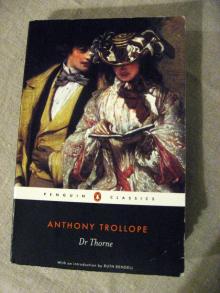 Doctor Thorne
Doctor Thorne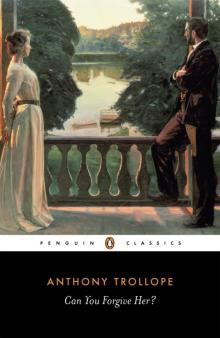 Can You Forgive Her?
Can You Forgive Her?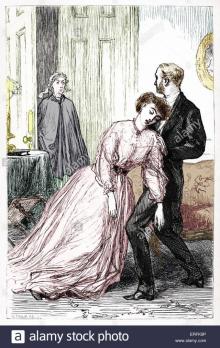 The Last Chronicle of Barset
The Last Chronicle of Barset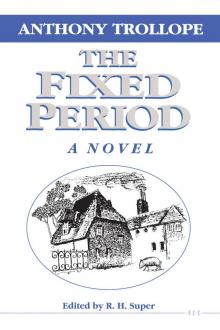 The Fixed Period
The Fixed Period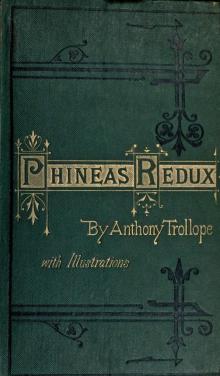 Phineas Redux
Phineas Redux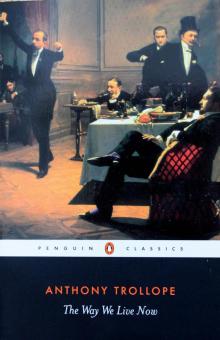 The Way We Live Now
The Way We Live Now Castle Richmond
Castle Richmond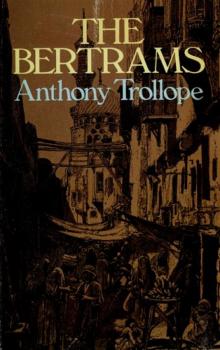 The Bertrams
The Bertrams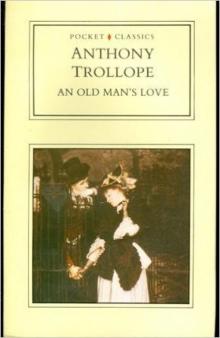 An Old Man's Love
An Old Man's Love The Belton Estate
The Belton Estate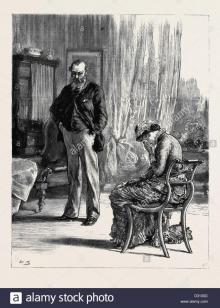 Marion Fay: A Novel
Marion Fay: A Novel The Claverings
The Claverings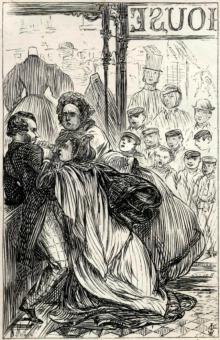 The Struggles of Brown, Jones, and Robinson
The Struggles of Brown, Jones, and Robinson Nina Balatka
Nina Balatka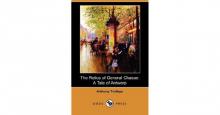 The Relics of General Chasse: A Tale of Antwerp
The Relics of General Chasse: A Tale of Antwerp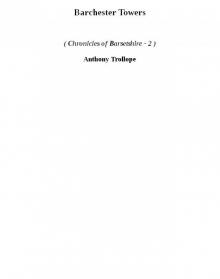 Barchester Towers cob-2
Barchester Towers cob-2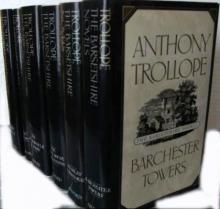 The Chronicles of Barsetshire
The Chronicles of Barsetshire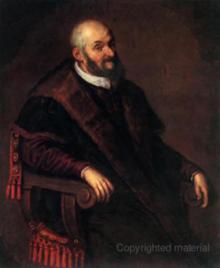 The Warden cob-1
The Warden cob-1 Framley Parsonage
Framley Parsonage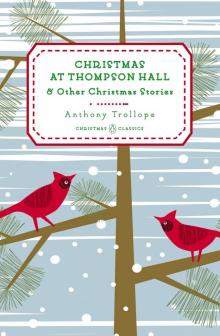 Christmas at Thompson Hall
Christmas at Thompson Hall The Warden
The Warden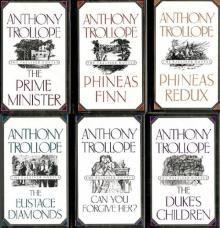 The Palliser Novels
The Palliser Novels The Small House at Allington
The Small House at Allington Barchester Towers
Barchester Towers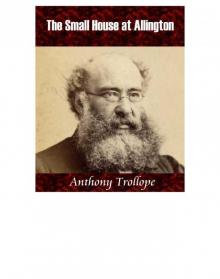 The Small House at Allington cob-5
The Small House at Allington cob-5 The Duke's Children
The Duke's Children Phineas Finn, the Irish Member
Phineas Finn, the Irish Member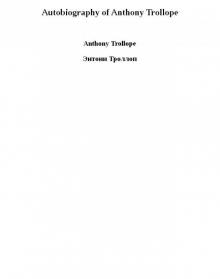 Autobiography of Anthony Trollope
Autobiography of Anthony Trollope